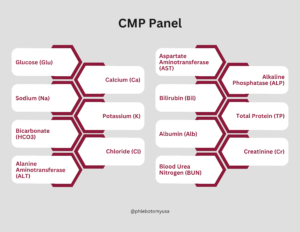13 Jan What Your CMP Results Are Telling You
 When you receive your blood work, you might feel overwhelmed by a confusing mix of letters and numbers. Or you may not know what the panel is testing at all! However, blood panels are vital indicators of your overall health and bodily functions. As such, understanding them is of utmost importance. Don’t worry; we’ve got you covered. In this article, we’ll explore the Comprehensive Metabolic Panel (CMP), what it tests, and what its measurements mean. By the way, if you love this breakdown on the CMP, be sure to read our guide on the Complete Blood Count (CBC) panel.
When you receive your blood work, you might feel overwhelmed by a confusing mix of letters and numbers. Or you may not know what the panel is testing at all! However, blood panels are vital indicators of your overall health and bodily functions. As such, understanding them is of utmost importance. Don’t worry; we’ve got you covered. In this article, we’ll explore the Comprehensive Metabolic Panel (CMP), what it tests, and what its measurements mean. By the way, if you love this breakdown on the CMP, be sure to read our guide on the Complete Blood Count (CBC) panel.
Blood Glucose
Blood Glucose, or blood sugar, is essential for providing energy to the body’s cells. High levels can point to diabetes, where the body struggles to regulate sugar due to insulin issues. Low levels, known as hypoglycemia, can cause symptoms like dizziness and confusion, often due to too much insulin or not enough glucose. Managing blood glucose is vital for avoiding complications like nerve or kidney damage.
Normal Range:
-
- Fasting: 70-100 mg/dL
Calcium
Calcium is crucial for building and maintaining strong bones and teeth and for muscle contraction and blood clotting. Abnormal calcium levels can indicate issues like low vitamin D, kidney failure, or parathyroid gland disorders. Both high and low levels can lead to serious health problems. Maintaining proper calcium levels is important for overall health, requiring a balanced diet and healthy organ function.
Normal Range:
-
- 8.5-10.2 mg/dL
Electrolytes
Sodium (Na)
Sodium maintains fluid balance within the body and is essential for proper nerve and muscle function. It helps regulate blood pressure and is crucial for transmitting nerve signals. Abnormal sodium levels can lead to dehydration, confusion, and, in severe cases, seizures or coma.
Normal Range:
-
- 135-145 mEq/L
Potassium (K)
Potassium is vital for properly functioning muscle cells, particularly in the heart. It helps regulate heart rhythm and muscle contractions and maintains normal blood pressure. Low potassium can cause muscle weakness and heart rhythm disturbances, while high levels can harm heart health.
Normal Range:
-
- 3.5-5.0 mEq/L
Bicarbonate (HCO3)
Bicarbonate is a major element in the body’s buffering system, helping to maintain the pH balance in the blood and tissues. It neutralizes excess acids in the body, thereby preventing the blood from becoming too acidic. Imbalances in bicarbonate levels can be indicative of respiratory or metabolic issues.
Normal Range:
-
- 22-29 mEq/L
Chloride (Cl)
Chloride works closely with sodium to help regulate the body’s fluid balance. It also plays a critical role in producing stomach acid (hydrochloric acid), which is essential for digestion. Abnormal chloride levels can be related to dehydration, kidney problems, or other metabolic issues.
Normal Range:
-
- 96-106 mEq/L
Liver Function Tests
Alanine Aminotransferase (ALT)
Alanine Aminotransferase, commonly known as ALT, is an enzyme primarily found in the liver. It plays a crucial role in metabolizing proteins. High levels of ALT in the blood often indicate liver damage or inflammation, as this enzyme is released into the bloodstream when liver cells are injured. Very high levels of ALT can be a sign of liver conditions, such as hepatitis or liver injury.
Normal Range:
-
- 7-56 units/L
Aspartate Aminotransferase (AST)
Aspartate Aminotransferase, or AST, is an enzyme found in various body parts, including the liver, heart, and muscles. While it helps metabolize amino acids, AST levels are especially monitored for liver health. Like ALT, elevated AST levels can indicate liver damage, but since AST is also found in other organs, it’s often evaluated with ALT. High AST levels, especially when they exceed ALT levels, can also indicate heart or muscle issues.
Normal Range:
-
- 10-40 units/L
Alkaline Phosphatase (ALP)
Alkaline Phosphatase (ALP) is an enzyme related to the bile ducts in the liver. It’s also present in bones and the placenta. High ALP levels can indicate blockage of bile ducts, liver inflammation, or even bone diseases. High levels of ALP might indicate liver or gallbladder issues, including gallstones or tumors.
Normal Range:
-
- 44-147 IU/L
Bilirubin
Bilirubin is a waste product from the breakdown of red blood cells. Normally processed and excreted by the liver, it’s an important marker of liver function. High bilirubin levels can lead to jaundice, characterized by yellowing of the skin and eyes, and may indicate liver damage or disease. Elevated bilirubin levels can be indicative of liver disorders, such as cirrhosis or hepatitis, or issues with bile ducts.
Normal Range:
-
- 0.1-1.2 mg/dL
Total Protein (TP)
Total Protein measures the total amount of protein in your blood and is essential for assessing overall health. This test includes both albumin and globulin proteins. High levels can indicate chronic inflammation or infections, while low levels may suggest liver or kidney disease or malnutrition.
Normal Range:
-
- 6.0-8.3 g/dL
Albumin (Alb)
Albumin, the most abundant protein in the blood, is crucial for maintaining the blood’s osmotic pressure, which helps keep fluid from leaking out of blood vessels. Lower albumin levels can indicate liver disease, kidney disease, or malnutrition, while higher levels are less common and can be due to dehydration.
Normal Range:
-
- 3.4-5.4 g/dL
Kidney Function Tests
Creatinine
Creatinine is a waste product generated from the normal breakdown of muscle tissue. It is filtered out of the blood by the kidneys and excreted in urine. Consistent levels of creatinine in the blood are a sign of healthy kidney function. High creatinine levels can indicate impaired kidney function or kidney disease, as it shows the kidneys are not effectively filtering this waste product. It’s important to note that creatinine levels can vary based on age, race, and body size.
Normal Range:
-
- Men: 0.6-1.2 mg/dL
- Women: 0.5-1.1 mg/dL
Blood Urea Nitrogen (BUN)
Blood Urea Nitrogen (BUN) measures the amount of nitrogen in the blood that comes from the waste product urea. Urea is produced when the liver breaks down protein and amino acids and is then removed from the body by the kidneys. The BUN test is used to assess kidney function. High BUN levels can suggest impaired kidney function or conditions that result in decreased blood flow to the kidneys, like dehydration or heart failure. A high protein diet can also cause high BUN levels, while low levels may occur with malnutrition or severe liver damage.
Normal Range:
-
- 7-20 mg/dL
Conclusion
In conclusion, your Comprehensive Metabolic Panel (CMP) is more than just another test – it’s an insightful look at your health. Each element of the CMP, from your blood sugar levels to your liver and kidney function, tells a story about your overall well-being. By monitoring these numbers, you can catch early signs of potential health issues before they become bigger concerns. Think of your CMP as a dashboard that gives you a snapshot of your body’s inner workings. Understanding these results empowers you to have more meaningful conversations with your doctor, leading to personalized health strategies. So, the next time you look at your CMP report, remember that it’s a vital tool in your journey toward maintaining a healthy and vibrant life.

